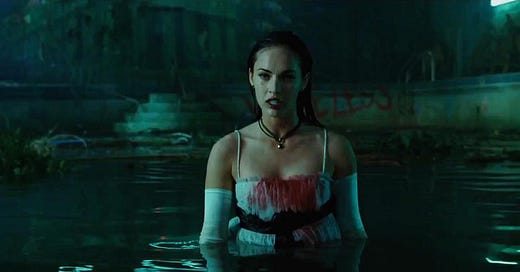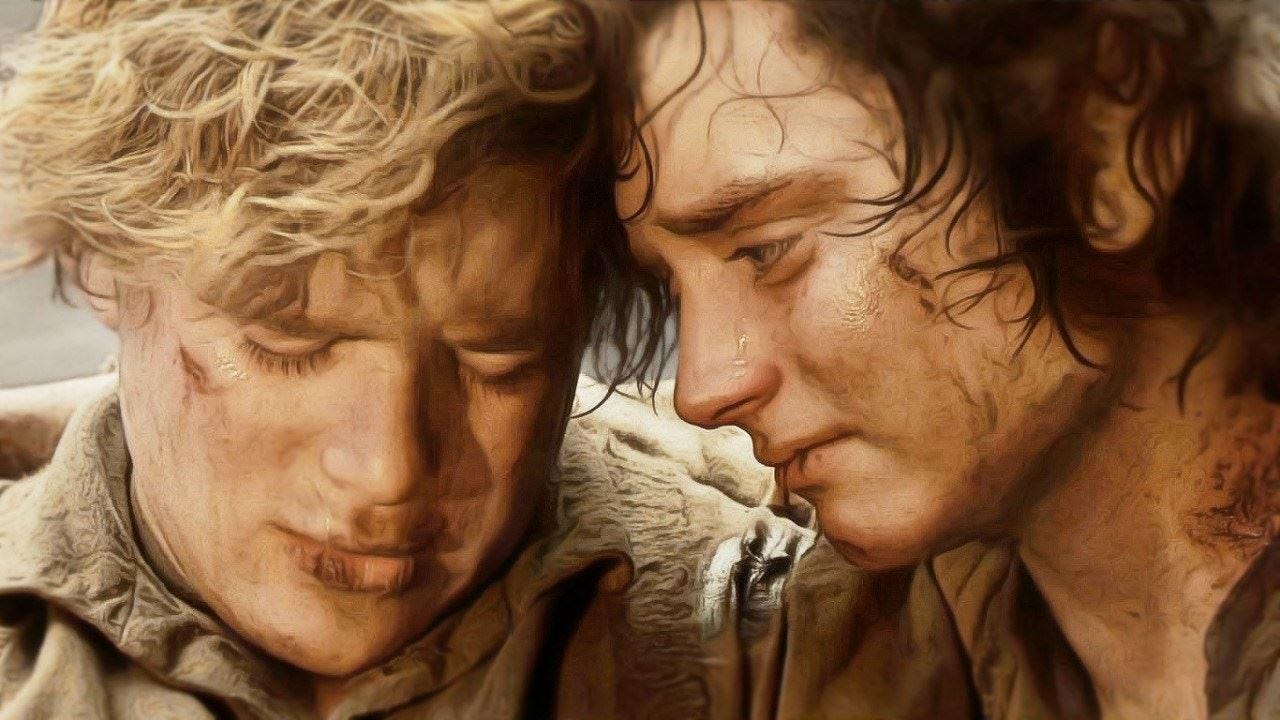Spoilers for: Lord of the Rings, yes, the whole thing, and also Jennifer’s Body!
When you grow up queer in America, (or anywhere, really) there’s this very distinct feeling you have when you consume media. That is, that none of it is truly for you. And the media that does exist for you is typically very one-note.
Because of this, we tend to end up seeing ourselves in relationships that might not have been otherwise labeled queer. We project our feelings and our experiences onto stories that were not meant for us, just because there isn’t much of a story for us. Take for example, how many queer people resonate with the storyline of The Little Mermaid, and the idea of giving up your voice to change your body. Or perhaps, the wealth of people that believe that there’s significant queer subtext in The Outsiders (or The Great Gatsby, which we’ll be talking about in the next installment). There are also quite a number of gay people (including me) that will insist to your face all day long that Stu Macher from Scream is desperately in love with his partner-in-crime, Billy Loomis.
The point is that whether or not it’s present in the text, queer people can and will latch onto things. And one of those things that we latched on to pretty heavily (at least us fantasy-long queers) is the relationship between Sam and Frodo in Lord of the Rings.
So for this little mini-series, I’ll be doing a deep-dive into some of my favorite queer media, ranging from “explicitly queer” to “people would fight me on the internet about this” and directly comparing their main relationships to the relationship between Sam and Frodo in Lord of the Rings.
We’ll start off with something explicitly queer, and one that you’ll probably need to just trust me about. I promise in the next installment there’ll be an example that is more high-brow literature, but for now my first connection is the cult classic, Diablo Cody’s Jennifer’s Body.
I recognize that this is a little bit insane of a comparison, but like I said, just trust me, okay?
Jennifer’s Body and Lord of the Rings were both formative experiences for me as a child, and partially for similar reasons. When you look at them from a big-picture perspective, are they really that different?
This post, and these connections, were spurred by the idea that Sam is devoted to Frodo, but Frodo isn’t necessarily devoted to Sam in the same way.
Let’s list the comparisons. For this to work, we have to assume that Sam is in the position of our beloved protagonist, Needy Lesnicki. Which, of course means that Frodo is Jennifer Check, body and all. (Does this make Gollum Chip? I’m not gonna think about that.)
The most important thing to consider outside of this, though, is the ring. What role does it play in all of this? Great question! In this great analogy, the ring plays the role of whatever the hell was possessing Jennifer that gave her (and then eventually Needy) all of those insane powers and the need to eat boys to live!
Why does it work out like that?
Let’s continue the comparisons. Frodo and Sam have a deeply connected relationship to begin with. They’ve known each other for a long time, as Sam is Frodo’s gardener. In a similar vein, Needy and Jennifer have known each other for just as long! They grew up together, they were childhood friends! And at the same time, both of these relationships were progressed and heavily intensified by a pretty insane call to adventure. These calls take incredibly different forms (I mean, getting assaulted by a shitty grimy rock band versus…the One Ring) but at the end of the day, they serve the same purpose. To push forth the plot, but also to strengthen the connection between the characters within the story itself.
On top of just that, though, there are some connections that I’d like to point out about the end of the story as well. Sam chooses to carry Frodo up Mount Doom to destroy the ring. He knows damn well that it might kill the both of them, so why does he do it? Aside from just the simple fact that it would save the world. Why does he do that for Frodo?
If you answered “because he loves Frodo” then ding ding ding you get a prize!
If Sam didn’t give half of a shit about Frodo, or if he straight-up just didn’t like or feel connected to Frodo in any way, would he have made half of the choices he makes throughout the entire book? No!
In the same vein, let’s talk about the end of Jennifer’s Body, and Needy’s choice to kill Jennifer. Why does she do it? Other than to save the world (the teen male population of their town) from certain doom (the hands of Jennifer Check)?
I’m here to argue that it’s because Needy loves Jennifer. Maybe this is an unexpected choice, because at that point in the movie, it seems clear that Needy is doing it to get revenge for Jennifer attacking her boyfriend, but things are allowed to be complicated!
Needy recognizes that she is never going to get back the Jennifer she knew and loved. Sam realizes that he is never going to get back the Frodo that he knew and loved. They both make decisions that feel impossible in the face of everything they’ve experienced out of love for the person they grew up alongside.
I’m choosing deliberately to connect these two because something that connects queer people as a whole is the idea that we might want something we know we cannot have, and in each of these situations, the characters are desperately wanting something that they are unable to obtain. We feel intensely connected to these relationships because we see ourselves in them. We see ourselves in Sam, the simple gardener who would risk life and limb for Frodo because he loves him. We see ourselves in Needy, and the idea that maybe we can’t tell whether or not the attraction we feel is due to queerness, or just a very intense friendship.
Does this connection between two characters exist as just a simple projection? Are we, the queer people in question, pushing our agenda onto characters that wouldn’t otherwise exhibit these traits without us desperately searching for crumbs?
Like I said in the beginning, the queerness in Jennifer’s Body is pretty explicit. At one point, Jennifer literally says to Needy that she “goes both ways.” They definitely do kiss on-screen, and it is decidedly just a very queer movie over all, if you’re someone who knows how to look out for those sorts of signs. The text supports that Jennifer and Needy have a sort of sexual tension between them.
So what about Lord of the Rings? What about Sam and Frodo? I mean, we have obvious admissions of love, hand-holding, and a clear sense of self-sacrifice, but what makes it queer and pushes it past just the idea of bros being dudes?
Simple! It’s the yearning. While I won’t go much into the idea of it here, because that’s for the next installment of this series, it’s important to note the relationship between the queer existence and the idea of yearning. Like I said just a few sentences ago, “something that connects queer people as a whole is the idea that we might want something we know we cannot have” whether that presents as a relationship with someone who might be off-limits to us, a body that we were not born with, or a variety of other things. Sam yearns for a quiet life, to continue as Frodo’s gardener, and serve him as simply as he knows how. Because that’s what Sam does. He’s used to the quiet yearning that comes from across a garden, or through a window, listening to conversations he knows he shouldn’t.
Sam yearns to belong to something, in the way that all hobbits seek community. But for him, I think it’s just a little bit more.
Next time on Queer Relationships in Subtext…
Let’s dive into the idea of yearning from a queer and literary perspective. Let’s go to extremes for the ones that we love. Let’s talk about Lord of the Rings and the inherent queerness in The Great Gatsby! Is the Green Light on Gatsby’s Dock just a different version of the Eye of Sauron? We’ll find out together tomorrow! See you then!






This a well-crafted comparison, and one whose foundation (i.e., Frodo's and Sam's borderline homonormative behaviors) likewise stood out to me throughout my reading of the trilogy. To throw another comparison into the mix, I could not help but think of Tyler, the Creator's "Igor" each time you mentioned some notion of unreciprocated homosexuality. "Igor" represents, of course, an overtly expressive and violent album, but it is no stretch to assert that Sam ultimately finds himself in a position similar to Tyler's--frustrated yet compelled by an undesirable journey, and one that terminates in departure. Thank you for inspiring that thought, as it had not dawned on me until reading your own article! Great work!
This was such a great comparison and your discussion about finding queerness in characters who are considered or depicted as non-queer was so well written that it made me fully understand the recent discussions about queerness in canonical literature such as The Great Gatsby or The Outsiders. Though I vaguely remember Jennifer's body your breakdown and comparison to Frodo and Sam was not only intriguing but valid. Thank you for sharing!